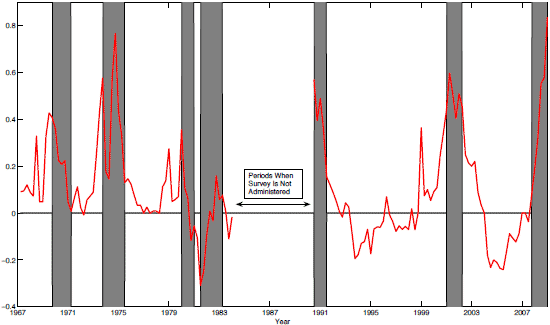Do credit conditions systematically affect stock market behavior? In the March 2010 draft of their paper entitled “Credit Conditions and Expected Stock Returns”, Sudheer Chava, Michael Gallmeyer and Heungju Park investigate whether changes in bank lending standards (net percentage of banks reporting tighter standards for commercial and industrial loans in Federal Reserve Board’s quarterly Senior Loan Officer Opinion Survey on Bank Lending Practices) lead U.S. stock market returns. Using data from this survey from the first quarter of 1967 through the fourth quarter of 2008 (publicly available well before the end of the reported quarter) and contemporaneous returns for the broad U.S. stock market, they conclude that:
- The net percentage of senior loan officers reporting tighter credit at their banks tends to rise (fall) entering (exiting) a recession (see the chart below).
- There is a strong negative relationship between the net percentage of senior loan officers reporting tighter credit and future U.S. stock returns at horizons up to a year. The predictive power of this indicator decreases beyond one year.
- This finding holds for both in-sample and out-of-sample statistical measures and for a range of robustness tests.
The following chart, taken from the paper, tracks the net percentage of senior loan officers reporting tighter credit for commercial and industrial lending via the Senior Loan Officer Opinion Survey from the first quarter of 1967 through the fourth quarter of 2008. Shaded regions indicate NBER-dated recessions. It appears that this measure of credit conditions is a leading indicator for the business cycle and therefore a plausible contender for predicting stock market returns. The study focuses on survey data since the second quarter of 1990 because of inconsistencies in/absence of the relevant survey question prior to that quarter.

In summary, evidence indicates that the net change in commercial and industrial credit standards as measured by the Federal Reserve Board’s quarterly survey of senior loan officers may be a useful predictor of U.S. stock market returns at horizons up to about a year.
Cautions regarding findings include:
- The sample since 1990 is small in terms of number of credit cycles.
- Translating findings into a stock market timing strategy requires further modeling.